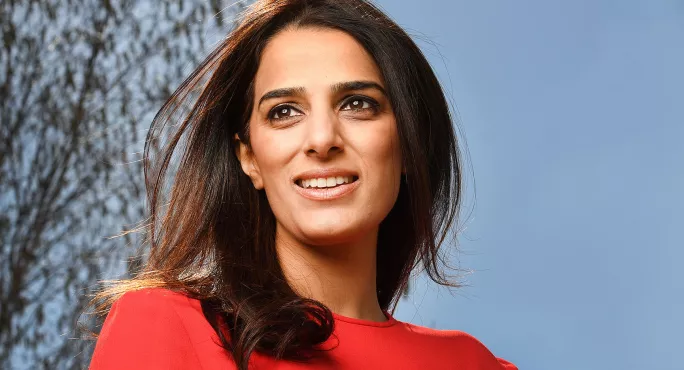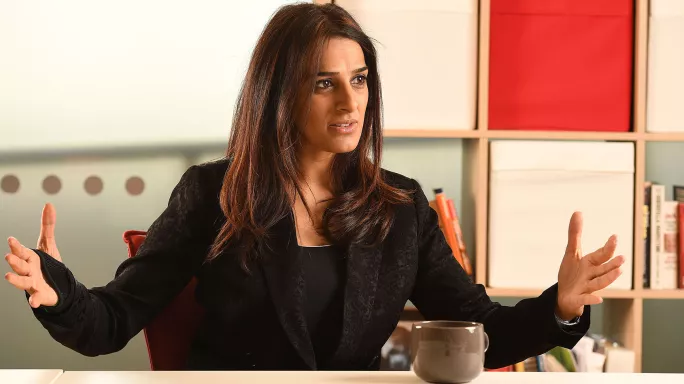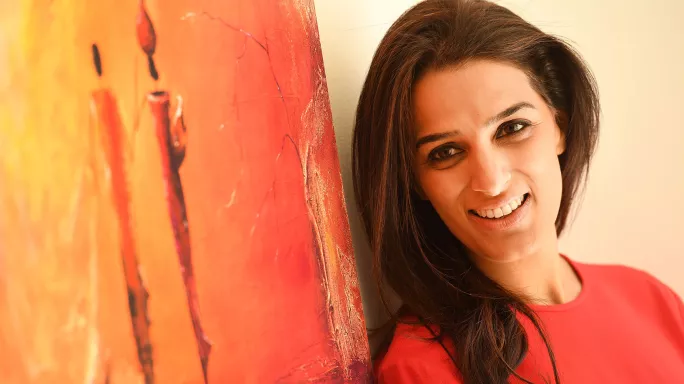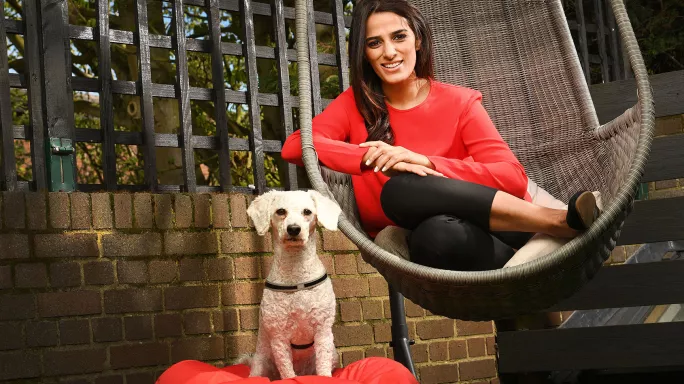
- Home
- How AI can cut workload and create ‘super-teachers’
How AI can cut workload and create ‘super-teachers’

If there is one thing that shines through in a conversation with Priya Lakhani, it is her passion and enthusiasm.
After missing her grades at A level, she talked her way onto her preferred university course. From a standing start, she set up a food company that supplied Waitrose. And she has funded schools in Africa and India.
Now CENTURY Tech, the edtech company she founded, is expanding rapidly. Lakhani has become one of the most prominent pioneers in the field, giving evidence to MPs on the fourth Industrial Revolution, co-founding an institute for ethical AI in education and being made an OBE.
Quick read: 'DfE investment needed for teachers to benefit from AI'
Analysis: Is edtech immune from rigorous research?
Profile: Interactive whiteboard pioneer with a ‘killer idea’ to cut workload
Her enthusiasm is evident from the second that Tes finishes asking the first question of the interview: “Tell me about your own schooling”.
Her response, which lasts for 64 minutes, takes in everything from her prep school in Cheshire to Google search results linking her name to the word “penis”, and setting up supply chains for a curry sauce company to making money from Curly Wurlies.
Now, this same passion is set on ushering in a new age of differentiated learning where teachers are free to teach.
Tech that tells teachers which pupils to praise
So, what is CENTURY Tech?
The company is based in the heart of London’s Bloomsbury, and its office is a mix of internet start-up – giant bean bags and an electric guitar propped up against the wall – and corporate boardroom, with formal chairs and books about MBAs.
It bills its product as “the first truly intelligent teaching and learning platform”, combining “learning science, artificial intelligence and neuroscience to improve learning outcomes and reduce teacher workload”.

The online platform uses a pupil’s interactions with it to identify their knowledge, skills, gaps, pace of learning and when information has passed from their short-term to long-term memory.
This is then used to create an “individualised path” for each student, made up of 10 micro-lessons, or “nuggets”, with a range of questions that constantly assess them and provide feedback.
One of its big claims is to not only know when a pupil is struggling, but why, and be able to then address the problem.
For the teacher, it provides real-time information that shows them how pupils are performing, telling them “who to focus on, who needs stretch, who to praise for commitment, and who needs to make more effort”. And real-time video and audio feedback promises to save teachers time marking books.
A promotional video makes a pitch squarely aimed at teachers, saying they can “spend more time doing what they signed up for: teaching”.
'I decided that I was going to change the world'
When Lakhani was a child, her schools may not have seen her potential but her early life contained clues about her ambition and passion.
She had a spell at Manchester High, a private school which “constantly told my parents that ‘this really isn’t for Priya – she’s not really able to cope with the academic standard here’”.
What she remembers is “how damaging that is to a child when they are hearing it in front of the parents”.
Things have improved now, she says, and she sees “a lot less of slamming children and their academic capability right in front of their faces”.
She knew she wanted to make a difference early on: “I decided at a very young age, at the age of 6, that I was going to change the world”.
It was a decision that stemmed from the winters and summers she would spend with her family in East Africa. Back in Cheshire, every evening she would think about the poverty she had been surrounded by.
“At the time, possibly naively…What do you think about as a child when you think about equity and injustice? You think about the law, so I said I’m going to be a barrister,” she says.
“I was really into reading newspapers and what was going on in the world, and I thought newspapers were quite negative, so I thought, ‘I’m going to be a barrister and I’m going to try to change the news so it’s more positive.’”
Her grammar school told her it was an impossible ambition, and the sixth form threatened not to sign her Ucas form if she applied for law.
Her entrepreneur father arranged for her to be tutored for six days a week, and after threats to sue for loss of earnings, the school did eventually sign the form, but despite this she still missed her grades.
Over the phone, Queen Mary University in London rejected her plea for a place on the law and economics course she had set her heart on, but she was determined not to take no for an answer.

So she drove from Manchester to London with her pyjama-clad mother in the passenger seat, walked straight into the professor’s office, and was given a place after agreeing to play tennis and hockey for the university in her first year.
A similar approach aged 21 – donning a ball gown to attend a lawyers’ awards ceremony to button-hole the lawyers she wanted to work for – got her her first job, in media law.
It was a role that often involved representing newspapers in court, and sometimes had unintended consequences.
“I googled myself at one point and it said ‘Priya Lakhani…penis’”, she recalls with a laugh, after she had to make a formal courtroom apology on behalf of a newspaper about a story involving a man exposing himself.
'Where's the curry sauce company?'
The late nights at work, which meant she had to rely on supermarket pasta sauces rather than prepare her own, opened the door to her next career: food.
“I spotted a gap in the market: there were no fresh ethnic sauces on the supermarket shelves.
“At this point, there was a huge drive towards premium eating and healthy food, so I thought, ‘well, hang on, there’s only pasta sauces, and curry is the nation’s favourite dish, so where’s the curry sauce company?’”
Building on previous side projects as an entrepreneur – “When I was at school I was the kid that sold Chomp bars to my friends for profit and then scaled up to Curly Wurlies” – she decided to create the company herself.
Named Masala Masala, she saw it as her vehicle to fulfil that childhood dream of changing the world. She pledged that for every pot of sauce sold she would feed a homeless person in India a hot meal, and use any money to build schools in India and Africa, and provide vaccines to the underprivileged.
After turning up at Waitrose HQ and refusing to leave until she met their buyer of fresh sauces, she won a nationwide deal with the supermarket chain.
'I spotted two major, major problems in every school'
It was this entrepreneurship that put her on the radar of Vince Cable, and she joined the advisory board of the Department for Business, Innovation and Skills when he was secretary of state.
That role put her on yet another path, which would this time lead to CENTURY Tech.
After hearing from Matt Hancock – then a minister both at the Department for Education and the BIS – that 1.8 million children were in underperforming schools, she secured support to research the issue, and spent time visiting high- and low-performing schools.
“I spotted two major, major problems in every school,” she recalls, “which was that the one-size-fits-all delivery of education is just inadequate, and every teacher knows that.
“They want to differentiate for every child, and they actually do try to differentiate for every child, but it is just impossible to do when you have average class sizes of 27 to 32.
“The second problem, which again is not news to teachers, is workload.”
Lakhani concluded that while technology and data-driven decisions had transformed other industries, schools had “gone from a blackboard to a whiteboard, and that was it”.
After talking to technologists, she completed two nanodegrees in artificial intelligence and undertook courses on neuroscience, and posed a challenge.

“Could we build technology where we could input any curriculum on it – any national curriculum, any language, any author, any course – and then it would learn through pattern recognition and behaviours how you’re learning and then differentiate for you, so we could deliver mostly the knowledge part of the curriculum?
“Can we build technology that can then differentiate for every child and free teachers up in the classroom to have more time with those interventions, with that human-to-human, face-to-face interaction?”
She took her findings back to Hancock and Cable in 2013, and Lakhani says that the Lib Dem “just turned around in the office and he just said ‘Priya, why don’t you build it?’
“That’s when I said very quickly, ‘Yeah, that’s a great idea’ and then I went home and said, ‘What have I said yes to?’”
The age of the 'super-teachers'
CENTURY Tech was founded five years ago.
For the first couple of years, while its beta version was being built, it had about 12 members of staff, but it is now it is scaling up rapidly.
It currently has 60 members of staff, and Lakhani expects this number to grow to 100 this summer, with offices in four countries.
Abroad, CENTURY has been able to talk to government departments about sign up whole school systems, but the UK's fragmented school system makes it harder to make such big deals at home.
Still, CENTURY Tech has currently signed up 150 schools, and recently hired a team to expand this number.
Lakhani understands the scepticism of some teachers when they are told that the future lies in AI, and the visions of Hollywood films that it may conjure up.
But she says they soon change their minds when they use her product.
“They just say, ‘My gosh, this is so incredibly easy’. Imagine, you just tap a button and it tells you who needs support, who needs stretch, who to praise for commitment.
“If you tap the button on where that child is, it tells you exactly the micro-area in that curriculum that they are struggling with. It tells you not just if they’re struggling, but why they’re struggling.”
Lakhani’s vision is one where teachers are not replaced by technology, but their role is modified.
“The way I think it will change things is that we will have these subject expert teachers that will always be there, and actually we want more of them," she says.
“The reason we will get more of them, and retain more of them, is they’ll stop leaving due to that admin, micro-marking, micro-assessing that frankly is wearing them down and affecting their mental health. This removes a lot of that.”
For her, these will be the “super-teachers” who concentrate on skills as well as knowledge, and are freed up to create projects that weave together different subjects, and can spend more time on areas such as music and drama.
“Then, I think we are going to end up with a layer underneath that of facilitators. These are, again, teachers. They are a different kind of teacher. They can come in and support, and they might not be specialists in their field.”
Far from being a vision from a Hollywood film, it is a change she believes teachers could witness in their schools in the next five to 10 years.
CV – Priya Lakhani OBE
Education:
1984-1988: Bowdon Preparatory School for Girls
1988-1992: Manchester High School for Girls
1992-1999: Altrincham Grammar School for Girls
1999-2003: Queen Mary, University of London (BA Law and Economics)
2003-2004: UCL (Media Law and Bio Ethics)
2004-2004: New York University (Media Law)
Career:
2004-2008: Media, libel and privacy barrister, Newsquest Media Group, ITV, Teachers TV (EDML), Pearson Edexcel
2007-2008: Lecturer, Media Law, Westminster University
2008-2012: Founder and CEO, Masala Masala
2014-present: Founder and CEO, CENTURY Tech
Register with Tes and you can read five free articles every month, plus you'll have access to our range of award-winning newsletters.
Keep reading for just £4.90 per month
You've reached your limit of free articles this month. Subscribe for £4.90 per month for three months and get:
- Unlimited access to all Tes magazine content
- Exclusive subscriber-only stories
- Award-winning email newsletters
You've reached your limit of free articles this month. Subscribe for £4.90 per month for three months and get:
- Unlimited access to all Tes magazine content
- Exclusive subscriber-only stories
- Award-winning email newsletters



